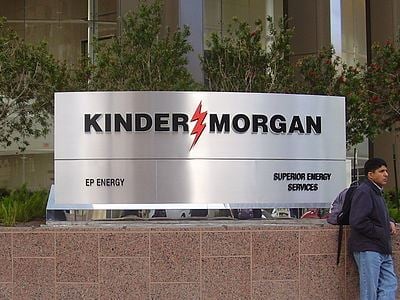

Kinder Morgan Inc. (NYSE: KMI) reported second-quarter 2019 results after markets closed Wednesday. The midstream giant posted adjusted earnings per share (EPS) of $0.23 per share on revenues of $3.21 billion. In the same period a year ago KMI posted EPS of $0.20 on revenues of $3.43 billion. Consensus estimates called for EPS of $0.24 and revenues of $3.59 billion for the quarter.
Kinder Morgan also said it will pay its previously announced $0.25 quarterly share dividend out of net income totaled $518 million and distributable cash flow (DCF) of $1.13 billion. In the same period last year Kinder Morgan reported a net loss of $180 million.
CEO Steve Kean commented:
During the second quarter, we maintained discipline by continuing to fund growth capital through operating cash flows without accessing capital markets. In addition, Fitch Ratings recognized our strengthened balance sheet as it joined other ratings agencies in upgrading our credit rating. In short, the company had another strong quarter and the future is bright.
Kean also touted the company’s network connecting key natural gas basins to “demand points” along the U.S. Gulf Coast. Kinder Morgan has proposed two new pipelines to transport natural gas from the Permian Basin to the coast: the Gulf Coast Express and the Permian Highway pipelines. The latter recently beat back a challenge from Texas landowners who were trying to stop the Kinder Morgan’s use of eminent domain to secure the land for its Permian Highway pipeline.
The increases net income and DCF were due to greater contributions from the Natural Gas Pipelines segment and lower financing costs. The gains were partially offset by the elimination of the Kinder Morgan Canada business segment following the Trans Mountain sale and lower CO2 commodity prices. Net income also improved year-over-year due to non-cash impairments taken during the second quarter of 2018.
The company said it expects to pay its scheduled annual dividend of $1.00 per share in 2019 and post DCF of approximately $5 billion ($2.20 per share) on adjusted EBITDA of about $7.8 billion. Kinder Morgan said it expects to invest slightly below $3.1 billion in growth projects and joint ventures this year and expects to close the year with a net debt-to-EBITDA ratio of approximately 4.6 to 1.
Shareholders are getting about 40% of the company’s DCF and probably don’t think that’s enough. On top of that, landowners and others have vowed to continue challenging the rights-of-way for the two natural gas pipeline projects. While it is certainly an uphill battle to beat an energy company in a Texas court, complaints and lawsuits can be costly in terms of time and money.
Analysts are looking for EPS of $0.24 in the third quarter on revenues of $3.66 billion. For the full year, estimates call for $1.01 in EPS and $14.78 billion in revenues.
Shares closed down about 1.5% Wednesday and dropped nearly 2% further in after-hours trading to $20.22. Kinder Morgan’s dividend yield of 4.78% is holding up its both its share price and its consensus price target of $21.79.
Essential Tips for Investing: Sponsored
A financial advisor can help you understand the advantages and disadvantages of investment properties. Finding a qualified financial advisor doesn’t have to be hard. SmartAsset’s free tool matches you with up to three financial advisors who serve your area, and you can interview your advisor matches at no cost to decide which one is right for you. If you’re ready to find an advisor who can help you achieve your financial goals, get started now.
Investing in real estate can diversify your portfolio. But expanding your horizons may add additional costs. If you’re an investor looking to minimize expenses, consider checking out online brokerages. They often offer low investment fees, helping you maximize your profit.
Thank you for reading! Have some feedback for us?
Contact the 24/7 Wall St. editorial team.


